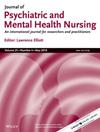Effect of Horticultural Therapy Program on Psychological Wellbeing, Hope and Social Adjustment Among Patients With Psychotic Disorders: A Nursing Perspective
Abstract
Objectives
This study aims to assess the impact of the HCT on psychological well-being, hope and social adjustment among patients with psychotic disorders.
Background
Patients with psychotic disorders frequently encounter challenges related to their psychological well-being, which encompasses a range of negative emotions such as depression, hopelessness and a lack of adjustment to social situations. As a non-pharmacological intervention, Horticulture Therapy (HCT) can be viewed as a supportive approach to psychiatric treatments, aiming to enhance both physical and mental health.
Method
The study utilised a randomised controlled trial research design. A study and control group of 60 patients with a psychotic disorder was established. The research took place at El-Ma'mora Hospital for Psychiatric Medicine, Alexandria, Egypt.
Findings
The IG exhibited significantly higher HHI scores compared to the CG, highlighting a notable improvement in hope among those who participated in the intervention. Regarding the Psychological Wellbeing Scale (PWBS), the IG scored significantly higher than the CG, indicating enhanced autonomy in the intervention group. The Modified Social Adjustment Scale (MSAS) scored significantly higher, indicating superior social adjustment in various domains of life for the intervention group.
Implication
The integration of horticultural therapy as a therapeutic intervention, the recognition of holistic care, the need for interdisciplinary collaboration, the promotion of patient-centered care, the importance of education and training and the encouragement of evidence-based practice.
Relevance Statement
The research findings highlight the potential benefits of horticultural therapy in improving the mental health and social adjustment of individuals with psychotic disorders.
Trial Registration
NCT06077279. https://register.clinicaltrials.gov/prs/app/action/SelectProtocol?sid=S000DM1R&selectaction=Edit&uid=U0006S6B&ts=2&cx=n4w92t

 求助内容:
求助内容: 应助结果提醒方式:
应助结果提醒方式:


